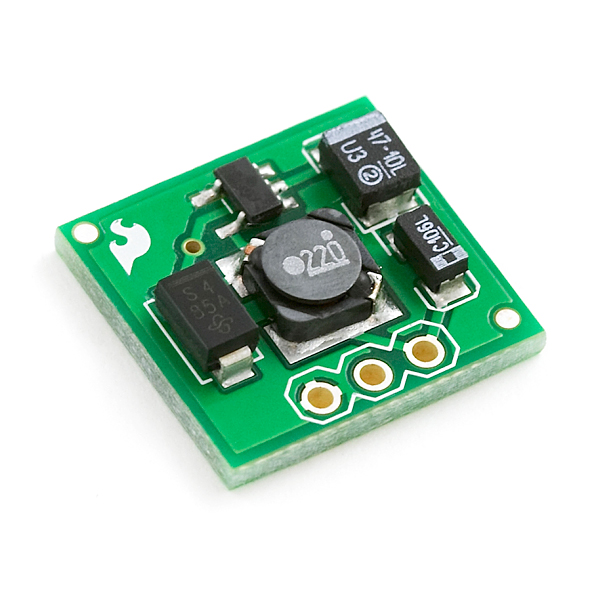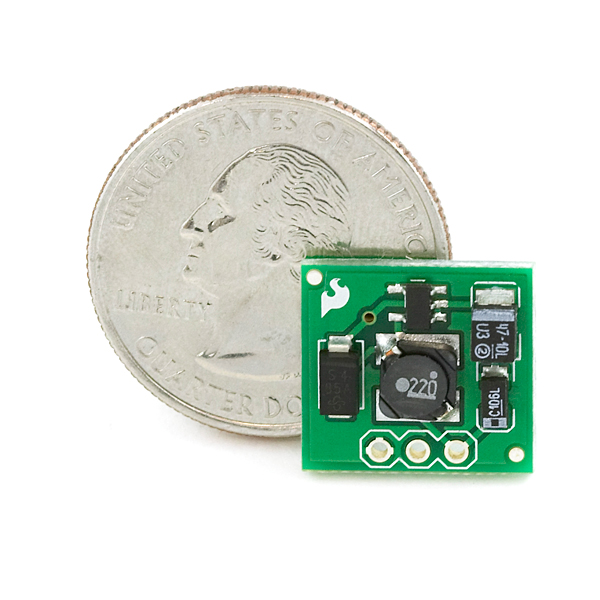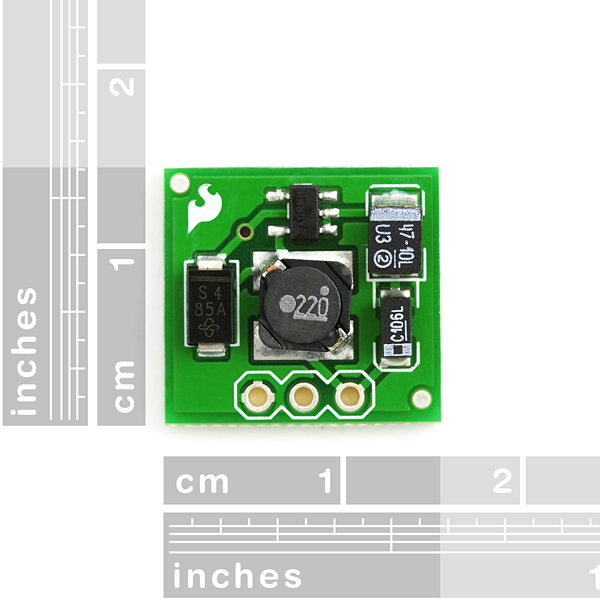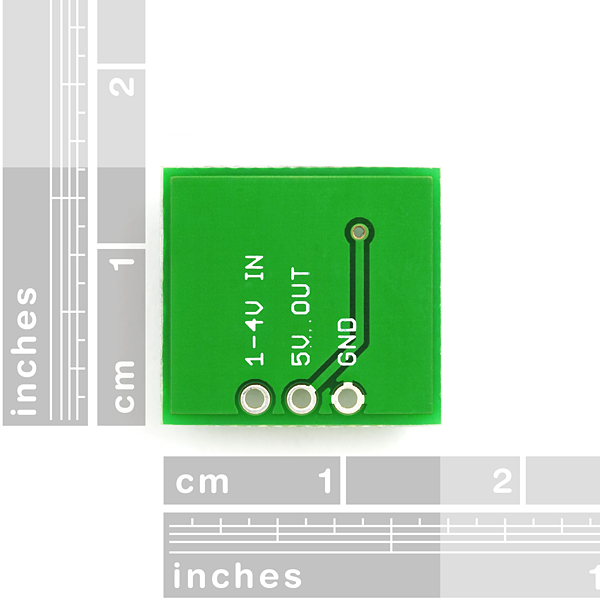NCP1400-5V Step-Up Breakout
Replacement:PRT-10968. The new version of this board is built around the NCP1402 which is essentially the same, though able to source more current. This page is for reference only.
The NCP1400 is a 5V DC-DC converter. The breakout board will accept voltage inputs between 1 and 4 Volts and output a constant, low ripple 5V output capable of sourcing up to 100 mA. This board is great for supplying power to 5V sensors on a 3.3V board, or providing 5V from a AA battery.
The breakout board includes the necessary peripheral components. The input, ouput and ground pins are broken out on a 0.1" grid to allow easy access on a breadboard.
Comments
Looking for answers to technical questions?
We welcome your comments and suggestions below. However, if you are looking for solutions to technical questions please see our Technical Assistance page.
Customer Reviews
No reviews yet.





My measurements on Sparkfun NCP1400 5V out 100 mA circuit (3.2V in, resistive load) efficiency vs current out: 81% @ 25 mA, 67% @ 50 mA. noise on 5V, 50 mA out: 34mVrms, 300 mVpp (20 MHz BW) 40 mVrms, 600 mVpp (100 MHz BW). With 5 V, 25 mA out: 18mVrms, 230 mVpp (20 MHz BW), 28 mVrms, 400 mVpp (100 MHz BW).
Current draw from 3.34V with no load: 1.2 mA
Comparing Pololu #798 (uses NCP1402, 5V out, up to 200 mA with >2.7V in). Measured at 3.2V input, resistive load: efficiency vs. current out: 81% @4 mA, 84% @25 mA, 86% @50 mA. noise on 5V out: 10 mVrms, 50 mVpp in 20 MHz BW and 14 mVrms, 100 mVpp in 100 MHz BW (independent of load current, over tested load range)
ripple frequency variable, increases with load current: 5 kHz @ 4ma, 50 kHz @ 50 mA output. Vout: 5.004 V to 5.010 V (Vout increases with higher load). (2nd unit tested, Vout= 4.98 V.) Current draw from 3.3V source with no load: 200 uA
Pololu is 2x max current, cheaper, smaller, lower noise, and more efficient at every load.
just received my one of these, fast delivery, well packaged too.
very happy with it. my bike lights run on a pack of li-ion 3.7v batts in series (10,000Mah)that are hooked up to a solar panel.
now with this added to my solar panel/battery box, i have USB 5v out to power my phone or my Bluetooth MP3 player that sits in my GPS/phone holder mounted on the handlebars!
previously i would use my smartphone as a GPS device when navigating, or have my Bluetooth MP3 player in the holder, and now i can have them CHARGE while i use them!
great stuff.
Does anyone know the minimum power required to use these step ups? For instance, at 1V, what is the minimum current needed to step up to 5V?
Will this help prolong a Teensy++ 2.0 from going into a brown out? I don't necessarily need BOD enabled, I just find that in my led project the leds are still fairly bright, but before they get very dim my board becomes unresponsive.
Thanks,
When I connect this to my Logomatic board, the Logomatic flips out (such as dropping the USB connection to my computer). It's almost as if it's drawing too much current although my current meter only shows 2mA. Anyone else have this problem?
I think you are using to much current, if the connection drops you're probably browning out. Were you measure idle current consumption or during the the real current consumption.
Any plans to stock the NCP1400 ic? not interested in buying a 3000 piece reel elsewhere
Is there any reason why, with a 4.7v lipo (Measured with 2 multimeters), this should output only 4.1v (Again, measured with 2 multimeters)? Does anyone have a solution?
4.7V? Lipos have a nominal voltage is 3.7 which is within the given range.
I ordered 3 of these and they are all giving 5.23 - 5.26V, not 5. Should they not be outputting something closer to 5V? Measured it with three different multimeters.
iff i change the power inductor it will give a bigger amperage?
can i charge a phone with this ?the phone has a battery of 800mah,that means it will charge in 8 hours with a 100ma?
ok so basicly i can power a arduino mini pro whit this supporting i use a single AA or a small photo cell from 1.5v to 5v to power the board correct?
where can i find the data sheet of the exact part ,
the data sheet provided is not for this chip !
This board can also be used to restore a proper +5V from USB power behind a hub where it can be +4.5V or less.
Got one of these with my freeday credit. lovely little board, 0.60x0.55 in (0.33 in^2) so fits just about everywhere, including atop a loose 18650 cell I have
Anyone know how much current this will draw when nothing is connected to Vout? I'd like to put my switch on the Vout side of the device, but I don't want my battery to slowly become drained. The datasheet isn't much help; it lists the 'off-state current' but I think that's with the CE pit, which isn't brought out, turned off. I'm interested in how much current is dissipated when the board is hooked up to the battery but nothing is connected to Vout.
"The quiescent current is typically 32 uA (VOUT = 2.7 V), and can be further reduced to about 1.5 uA when the chip is disabled (VCE < 0.3 V)."
On page 6 of the manual there is a graph called "Current
Consumption vs. Temperature". I think this is what your looking for. Now, I'd like it if someone else could verify this as datasheet isn't my mother-tongue but as far as I can see that's what your looking for. It puts the operating current (open-loop) at about 75 uA at 25 C.
On page 6 of the manual there is a graph called "Current
Consumption vs. Temperature". I think this is what your looking for. Now, I'd like it if someone else could verify this as datasheet isn't my mother-tongue but as far as I can see that's what your looking for.
This goes great with the Logic Level Converter. http://www.sparkfun.com/commerce/product_info.php?products_id=8745
NCP1400 available and in stock from Farnell
http://uk.farnell.com/on-semiconductor/ncp1400asn30t1g/dc-dc-step-up-converter-3-0v-smd/dp/1460672
Shouldn't it actually be http://search.digikey.com/scripts/DkSearch/dksus.dll?Detail&name=NCP1400ASN50T1GOSCT-ND ? This one is from digikey, but my point being that this is the *ASN50t instead of the ASN30t, i.e. 5V output instead of 3.3V
I'd like to use this power supply circuit on a larger PCB for a widget I'm designing in Eagle. Does anyone know where I can source the NCP1400? Digikey and Mouser list them, but don't seem to stock them.
Allied Electronics has it in their "Extended Range" which means 8-10 days lead time and $50 minimum (or $10 charge).<br />
<br />
http://www.alliedelec.com/search/searchresults.aspx?N=0&Ntk=Primary&Ntt=ncp1400
Can anyone tell me what the current rating of that inductor is?
Suggestion for the next batch: an extra ground pin next to Vin would simplify connections.
I've done this in eaglecad, making it Vin, Gnd, Gnd, Vout in a 4 pin header. No idea if ill ever get any made though
does this output anough current to charge a ipod touch
no it doe not have enough current to charge a touch instead use http://www.sparkfun.com/commerce/product_info.php?products_id=8290 it can handle up to 300ma which can charge a iphone/touch
any thought to breaking out the CE as well? Would be useful for building circuits with 'zero power' sleep mode.
Why is the input on this limited to 4V? The NCP1400 takes up to 6V, which lets you add an entire extra AA battery, for instance, or use an external 5V source when available. Are the caps limited to 4V? The inductors? The diode?
For a boost converter: Vin < Vout
Can this work with a Li-Po (peak voltage of 4.2 VDC)?
Yes, the NCP1400 will work with a 4.2V input. I've used this step-up board with a LiPo batt just to be sure.
If this seperated the dc in to the dc out then it could be used to isolate a SPI link between a microcontroler and a computer.
That is if the data traveled over isolated optocouplers.